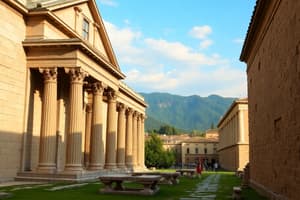Podcast
Questions and Answers
Which ancient civilization was known for its arts, philosophy, mathematics, democracy, and science?
Which ancient civilization was known for its arts, philosophy, mathematics, democracy, and science?
- Ancient Rome
- Ancient Greece (correct)
- Ancient China
- Ancient Egypt
What is one key value that Ancient Roman society placed high importance on?
What is one key value that Ancient Roman society placed high importance on?
- Fraternity
- Order (correct)
- Liberty
- Equality
When did the French Revolution take place?
When did the French Revolution take place?
- Between 1689 and 1700
- Between 1789 and 1799 (correct)
- Between 1750 and 1775
- Between 1810 and 1820
What significant change in government occurred as a result of the French Revolution?
What significant change in government occurred as a result of the French Revolution?
Which civilization is not mentioned in the text as one of the ancient civilizations studied in history?
Which civilization is not mentioned in the text as one of the ancient civilizations studied in history?
What principles were emphasized by the French Revolution that influenced modern democratic practices?
What principles were emphasized by the French Revolution that influenced modern democratic practices?
What role did the French Revolution play in shaping future revolutions worldwide?
What role did the French Revolution play in shaping future revolutions worldwide?
Flashcards are hidden until you start studying
Study Notes
History is a fascinating subject full of events from different eras around the world. One aspect of history involves studying ancient civilizations, which includes societies such as Ancient Greece, Rome, Egypt, China, India, Persia, and Mesopotamians. These civilizations all had their own unique cultures, customs, and beliefs. For example, Ancient Greek civilization was known for its arts, philosophy, mathematics, democracy, and science, while Ancient Roman society valued order, law, and justice.
Another significant event in history is the French Revolution, which occurred between 1789 and 1799. It started when France's King Louis XVI called together his nation's legislators to discuss changes he wanted made to his country. However, this didn't go according to plan because these representatives were elected by French citizens, who also came up with new ideas that would change government forever. This led to the fall of the monarchy and eventually brought Napoleon Bonaparte to power. The French Revolution played a pivotal role in shaping modern democratic practices as it emphasized equality, liberty, fraternity, and human rights, laying a foundation for future revolutions worldwide.
Studying That Suits You
Use AI to generate personalized quizzes and flashcards to suit your learning preferences.




